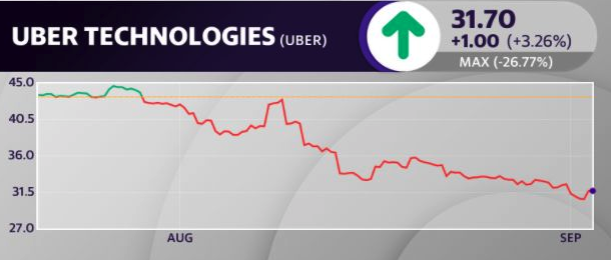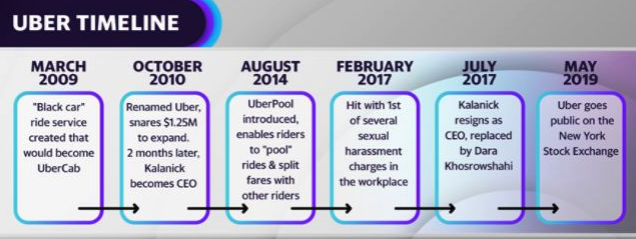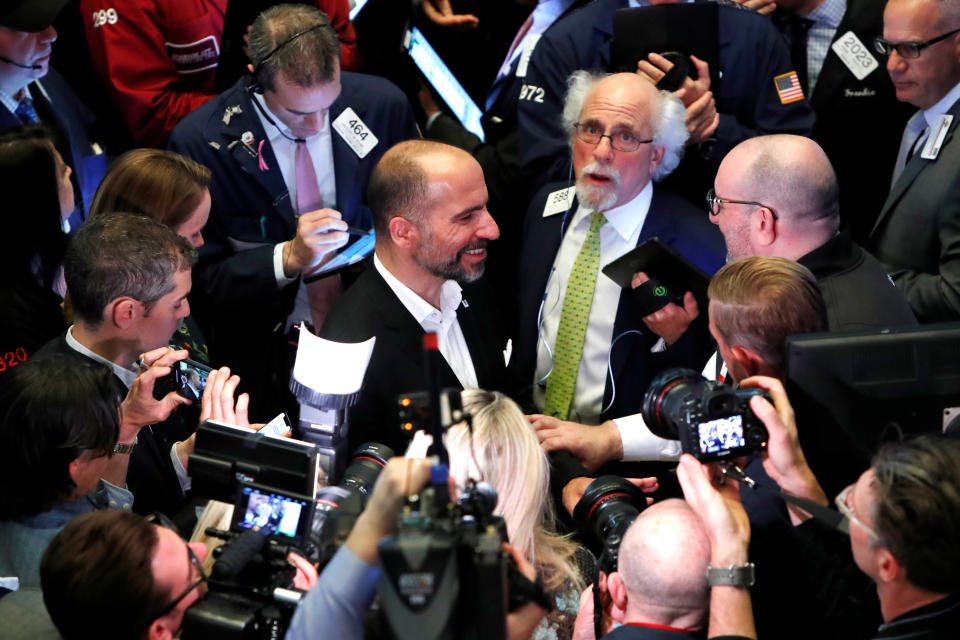Expect ‘another year or more of pain’ for Uber: author
Uber’s journey from a hot-shot unicorn to a newly public company struggling to find its footing has been very frustrating for Wall Street investors. And one tech insider says investors better buckle up their seatbelts because it will be at least another year before Uber (UBER) turns the corner.
In his new book “Super Pumped: The Battle for Uber,” New York Times technology correspondent Mike Isaac gives a glimpse into Uber’s rapid rise in Silicon Valley and its subsequent struggle to stay dominant in the wake of its recent IPO.
“There was so much hype around Uber as a private company for so long, and they have to prove that they really are this world-changing business,” Isaac said on Yahoo Finance’s The Final Round. “And I think there is going to be probably another year or more of pain to get there.”
Uber shares touched a record low on Tuesday, closing down 5.7% to $30.70 and falling below its previous low of $32.57 on August 30. As of Tuesday’s close, the company traded more than 30% below its May IPO price of $45 per share as investors continued to question Uber’s path to profitability.

Uber’s windy road to public markets
Uber’s new reality as a public company is a stark contrast to what Isaac calls Uber’s “glory days” of the early 2010s when the company was sealing billion-dollar financing deals and promising to transform the transportation industry.
“I think Uber came up in a very different time than we're in right now,” said Isaac, who began covering Uber for the New York Times in 2014. “If you remember back in 2010, 2011, 2012, they were raising like billion dollars every other month. It just seemed like their war chest kept getting bigger, their opponents weren't really that well-funded, and Lyft (LYFT) was basically at death's door.”
But just a few years later, Isaac says Uber was “on a collision course with itself,” with 2017 turning into “one of the worst years of sustained crises for any corporation in the history of Silicon Valley” as the company dealt with sexual harassment scandals, regulatory setbacks, increased competition, and a toxic corporate environment under the tumultuous leadership of founder Travis Kalanick.

“And then 2017 happened, and everything just took a dive in terms of their reputation, in terms of competitors coming in and getting much more funding,” Isaac said. “And it just seems like they have a lot more opponents to face now than they did before, so it's a very different fight and it's a much harder story to tell the Street when your valuation is already super high as a private company.”
Uber’s disappointing quarter
In its most recent earnings report, Uber unveiled a steep Q2 net loss of $5.23 billion, further fueling the already ballooning skepticism from investors.
“Uber loves to call itself Amazon and use that analogy, particularly because Amazon trained the Street to be OK with negative or razor-thin profit margins for a very long time,” Isaac said. “And I think the difference there is that the numbers are just so much more staggering in terms of Uber's losses, and the road to profitability isn't immediately apparent.”
Travis Kalanick vs. Dara Khosrowshahi
Then of course there’s a debate about Uber’s leadership over the years, which ranged from the tumultuous maverick founder Travis Kalanick to the more buttoned-up, Wall Street-friendly Dara Khosrowshahi, who took over as CEO after Kalanick was ousted in 2017. But even with Kalanick long gone, some are wondering whether his DNA is forever imprinted into the company’s future.

“In this book I talk a lot about founder culture, and the idea that the founders really imprint on the company that they build. And in a lot of ways, it really is Travis's thing,” Isaac points out. “And so Dara Khosrowshahi came in and he’s trying to put his mark on it, saying we're going to do the right thing, period. You don't have to feel bad using Uber. I don't think everyone quite fully believes that.”
With Uber continuing to struggle even under Khosrowshahi’s leadership, many are wondering whether Uber is missing that energy and tenacity that Kalanick notoriously brought to the company.
“One of the questions right now is, do we need some more of Travis back, do we need that fire that brought Uber to such great heights?” Isaac said. “And I think Dara was absolutely the right person for putting out the many fires that were going on in the building in 2017. But maybe some folks are itching for someone who can amp everyone up again.”

Iryna Kirby is a Producer for Yahoo Finance. Follow her on Twitter at @IrynaNesko.
Read more:
Follow Yahoo Finance on Twitter, Facebook, Instagram, Flipboard, LinkedIn, and reddit.
